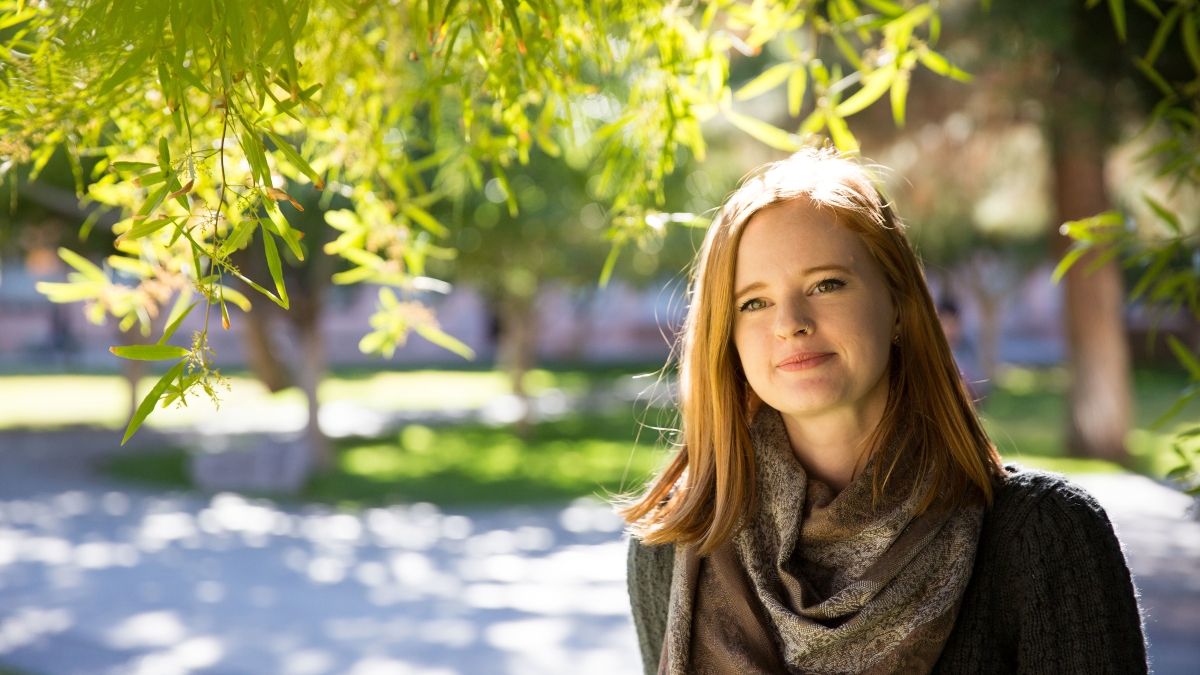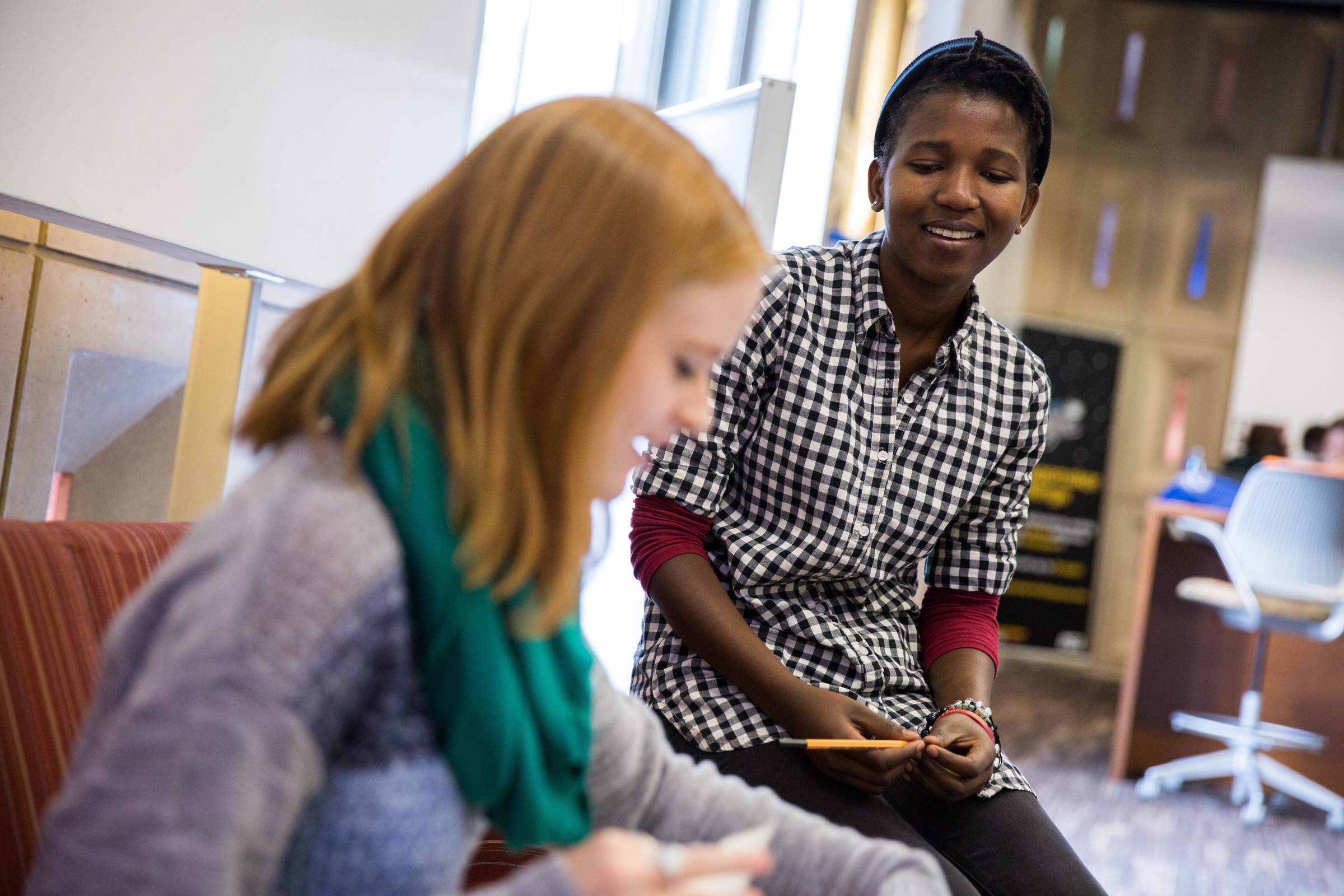Editor's note: This story is part of a series of student profiles that are part of our December 2015 commencement coverage.
When she was a child, Kaitlyn Fitzgerald took on the responsibility of helping to heal her family. As a new graduate of Arizona State University, she is setting her sights on repairing the world.
Since high school, Fitzgerald has devoted her life to social justice — helping refugees and those in need in Phoenix and beyond.
On Dec. 14, she will give two commencement addresses — as the student speaker for Barrett, the Honors College, and as the outstanding graduating student at the W. P. Carey School of Business. She will earn two degrees — in global studies and in business/public service and public policy.
Fitzgerald said her speech at the W. P. Carey ceremony will touch on “The Lorax,” the Dr. Seuss book that includes the line: "Unless someone like you cares a whole awful lot, nothing is going to get better. It's not."
That’s a concept that she has embraced since her childhood in Gilbert.
“My mother was diagnosed with Parkinson’s disease shortly after I was born, due to complications in the pregnancy,” Fitzgerald said.
“Growing up, I was the primary caretaker for her. That forced me to mature a lot quicker than a lot of my peers.”
She monitored her mother’s medication, did much of the housework and helped her mother get around.
When Fitzgerald was in fifth grade, her 23-year-old brother died suddenly.
“Trauma and stress can make Parkinson’s progress faster. We were all going through a lot having lost him, but at the same time there was not really any time to grieve.
“I needed to be strong and responsible and to help pick up the pieces. That was the mindset I had as a kid. It was isolating.”
She read a lot, drawn especially to stories about young Jewish people during the Holocaust.
“Everyone thought it was morbid but I thought that if these people were going through so much more than me, I could do it.”
A turning point came while Fitzgerald was a student at Seton Catholic High School in Chandler and she read “A Long Way Gone: Memoirs of a Boy Solder,” by Ishmael Beah, the story of the author's life during the war in Sierra Leone and how he escaped.
She was shocked.
“I had thought that the difficulties and challenges and injustices of the world were in the past because after the Holocaust we said, ‘never again,’ right?
“That was when I realized there was a lot more work to be done and I would dedicate my life to doing the work to make the world a better place.”
Fitzgerald continued to read about Sudan and child soldiers, and she won second place in a fundraising contest to benefit the Arizona Lost Boys CenterThe center was established in 2002 to resettle and support “Lost Boys” — young refugees who were fleeing civil war in Sudan. In 2011, the center was renamed The Lost Boys Center for Leadership Development. in Phoenix.
“They gave us a cash prize for fundraising contest, which I thought was ludicrous so I re-contributed my prize and submitted paperwork to be a volunteer a few months later.”
The program director called, asking if she would like to teach English as a second language.
“I said, ‘You know I’m in high school, right?’ "
They were fine with it.
Unhappy with the lessons being taught, Fitzgerald redesigned the program and arranged for ASU students and retired teachers to help at the center.
“That’s how my boyfriend won me over — by volunteering with me,” she said.
Along the way, Fitzgerald learned some of the pitfalls of volunteer work.
While still in high school, she visited a small village in Ghana.
"The experience was transformational, but at the end of the two weeks that we spent plastering the classroom building, I realized that we were wasting resources by being there.
“We were there because we claimed to want to make a difference, yet we spent so much money to fly there and be cared for there — money that, had we directly invested into the project, would have resulted in more classrooms.”
After that, she launched the Anidaso Project, which buys handmade bags from a Ghanaian entrepreneur and sells them to fund scholarships for children in Ghana.
With her life already devoted to social justice, Fitzgerald got into her “dream school” of the University of California, Berkeley. But she was devoted to her family and her work in Arizona.
“I was still working with the Lost Boys, and my time with that organization was not through yet and I knew it, so I decided to see where ASU would take me.”
As it turned out, it took her to the passion of her life.
“When I walked into Changemaker CentralChangemaker Central is an organization that provides resources and opportunities for ASU students to create social change., I was mesmerized by the work they were trying to do, showing every student at ASU the potential they have to change their community and the world,” Fitzgerald said.
She became the student director for her sophomore and junior years, and during that time the group grew from a handful of students to more than 100 at all four campuses. Changemaker Central won the prestigious Ashoka U-Cordes Innovation Award in 2013 for its student-led initiatives.
After her terms as director of Changemaker Central, Fitzgerald took a job as the communications and logistics specialist with the MasterCard Foundation Scholars Program, which provides scholarships to students from Africa who commit to returning and improving their communities.
Kaitlyn Fitzgerald works with MasterCard Foundation Scholar Lilian Ngweta. Photos by Deanna Dent/ASU Now
She also studied abroad in Jordan and Palestine, and will earn a certificate in Arabic along with her two degrees.
Fitzgerald had an opportunity to work in Washington, D.C., but her devotion to her family kept her in Arizona while she decides her next move. Eventually, she says, she would like to get an MBA.
"I’m not completely sure what the world needs from me,” Fitzgerald said, but she is unwavering in her passion for helping humanity.
“I credit where I am right now completely to ASU, to the fact that it gave me an opportunity as a sophomore to have my dream job, and to work side by side with deans and vice presidents and to be in the conversation that students at other institutions are not allowed to be in.
“The fact that I believe we will make the world better I credit to ASU.”
More Business and entrepreneurship

ASU Prep program turns students into statisticians through the power of sports
Ask a high school kid if they want to attend a statistics class, and they might give you a blank stare or just laugh.Ask them if they want to go to a professional baseball game and their response…
The business behind the brand
Ask Jennifer Boonlorn ('01 BS in marketing) about the secret to a successful career in the luxury fashion industry and she'll tell you that community building is top of the list."I want to share…

Thunderbird at ASU ranked No. 1 in QS International Trade Rankings for third consecutive year
For the third consecutive year, Thunderbird School of Global Management at Arizona State University has been recognized as the world leader in international trade, a distinction awarded by…



